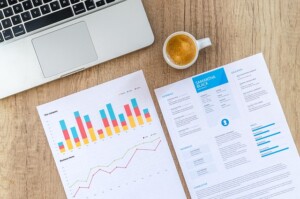Achieving competitive returns while potentially reducing portfolio risk through sustainable investments. Sustainable and profitable investment is demonstrating its power in the markets. Today, millions of investors take sustainability issues into account when deciding how to allocate their investments.
Investors not only question a company's carbon footprint, wages and working conditions of its employees, and diversity on its board of directors, among other aspects. They make these investment decisions because data shows that it increasingly makes financial sense.
«Investigadores señalan el potencial de obtener mayores rendimientos y reducir el riesgo cuando se incorpora tanto el análisis ambiental, social y de gobernanza (ASG) como el análisis de inversión tradicional en la toma de decisiones»,
«En el mundo de cambios estructurales en el que nos encontramos hoy, creemos que incorporar las temáticas de inversión sostenible e impacto es una obligación para los inversores que buscan minimizar el riesgo y crear un potencial de retorno».
says Anna Snider, Head of Due Diligence at the Office of Principal Investments at Merrill and Bank of America Private Bank.
The Numbers Speak
In a 2020 study, Hermes Investment Management found that companies with ESG characteristics outperformed, on average, companies without ESG standards (Federated Hermes International, "ESG Investing: How Covid-19 Accelerated the Social Awakening," Q4 2020). (Federated Hermes International, “ESG Investing: How Covid-19 Accelerated the Social Awakening,” Q4 2020.)
Recently, in the volatile markets of 2022, Morningstar's sustainability index in the United States outperformed its main index, the Morningstar index of large and mid-cap companies in the United States. índice de sostenibilidad de Morningstar en Estados Unidos superó a su índice principal, el índice Morningstar de grandes y medianas empresas en Estados Unidos.
Morningstar Sustainability Rating (A New Approach for Investors), Morningstar Sustainability Rating for funds, provides investors with a new way to evaluate funds based on the sustainability profile of underlying positions.
Dado que los desafíos globales presentan un riesgo considerable para la economía y para las empresas individuales, la inversión sostenible también puede ayudar a gestionar el riesgo de la cartera, señala Ekaterina Gradovich, analista de Debida Diligencia ASG en la Oficina de Inversiones Principales de Merrill y Bank of America Private Bank. Por ejemplo, dice: «La transformación económica sustancial requerida para la transición energética y la independencia energética puede determinar qué empresas se mantendrán competitivas y rentables en un futuro no muy lejano».
Además, un marco de inversión sostenible e impacto podría ayudar potencialmente a proteger su cartera de empresas cuyos productos o prácticas puedan exponerlos a multas, daños reputacionales, dificultades para retener empleados u otros problemas. «Estos factores introducen riesgos que los inversores deben tener en cuenta», afirma Gradovich. Según la investigación global de BofA, de las 17 quiebras entre las empresas del índice S&P 500 de 2005 a 2015, 15 (90%) involucraron organizaciones con historiales de malos puntajes ambientales y sociales.
The ABCs of Sustainable Investment
- Avoid – Evitar
- Consider strategies that seek to reduce negative social or environmental effects and help manage risk by limiting certain exposures.
- Benefit – Beneficios
- Explore strategies that aim to support positive social or environmental practices and enhance the potential for long-term competitive financial returns. For example: Leading companies in energy efficiency metrics.
- Contribute – Contribución
- Look for strategies that seek to promote measurable positive social or environmental outcomes and seek opportunities where impact is intrinsic to financial performance. For example: Social impact bonds.
ESG ratings
Critics of the sustainable investment selection system have argued that the numerous ASG rating services claiming to identify the best (or worst) companies from a sustainability perspective vary in quality and lack consistent measurement standards.
«Alguna de las críticas son válidas», señala Gradovich. «Las calificaciones son tan buenas como los datos subyacentes, y a menudo dependen demasiado del rendimiento pasado sin tener en cuenta hacia dónde se dirige una empresa», agrega. O pueden ignorar que una empresa «buena» en términos de prácticas ASG tiene un historial financiero deficiente.
Companies that perform well, for example, in social or governance areas but may lag in environmental performance, can still receive high ratings from external data providers.
La creciente demanda ha resultado en el «greenwashing» por parte de algunas empresas que afirman tener resultados ambientales o sociales positivos en sus declaraciones corporativas sin transformar su cultura y prácticas de manera significativa. Sin embargo, señala Snider, para mitigar riesgos, «los reguladores y los gestores de debida diligencia rigurosa exigen una mayor responsabilidad». Como resultado, más empresas están proporcionando datos detallados de ASG.
Where We're Headed
Alcanzar los objetivos de apoyar el cambio positivo y siostenible y generar retornos financieros requiere más que simplemente seleccionar valores de una de las numerosas listas de calificaciones ASG, advierte Snider. «Si bien las calificaciones pueden ser una herramienta útil como parte de una evaluación amplia de empresas o carteras, no deben ser el único referente para tomar decisiones de inversión», señala. Un análisis exhaustivo del enfoque financiero de cualquier estrategia es primordial.
Cuando su equipo evalúa la estrategia ASG de una inversión, Snider dice: «Además de nuestra evaluación fiduciaria de la inversión, observamos la profundidad y consistencia de la integración de los factores de riesgo y retorno de sostenibilidad por parte del gestor. Nuestro enfoque principal no se centra en las preferencias morales o éticas del gestor, sino en las proyecciones económicas e inversionistas prospectivas determinadas por este tipo de análisis». Una vez que el equipo está satisfecho de que los fundamentos financieros son sólidos, pueden pasar a evaluar el impacto sostenible de la inversión, agrega.
«La inversión sostenible e impacto parece probable que crezca en los próximos años», cree Snider, «y las herramientas utilizadas para medir el desempeño ASG seguramente evolucionarán y mejorarán». Con ese fin, sugiere que los inversores consideren integrar la inversión sostenible e impacto como parte de una cartera equilibrada y estratégica, «una que comience con consideraciones personales como metas de inversión generales y el nivel de riesgo con el que se sienta cómodo», agrega.
«Creemos que los inversores que adopten prácticas de inversión sostenible podrán posicionar sus carteras para un posible éxito a largo plazo»
«Las innovaciones para abordar los desafíos globales están creando algunas de las mayores oportunidades que veremos en nuestras vidas».
Snider asserts.
Para obtener más información sobre la inversión sostenible e impacto, y formas de considerar su incorporación en su cartera, lea «Impactonomics®: Performance Realities: Revisited» de la Oficina de Inversiones Principales.
Sustainable and impact investment managers and/or Environmental, Social, and Governance (ESG) may consider factors beyond traditional financial information when selecting securities, which could result in relative investment performance that differs from other strategies or market benchmarks, depending on whether those sectors or investments are in or out of favor in the market. Additionally, ESG strategies may rely on values-based criteria to eliminate exposures found in similar strategies or market benchmarks, which could also result in differing relative investment performance.
There is no guarantee that investments applying ESG strategies will be successful. There are many factors to consider when choosing an investment portfolio, and ESG data is just one component to consider.
Social impact bonds are a relatively new and evolving investment opportunity that is highly speculative and involves a high degree of risk. An investor may lose all or a substantial portion of their investment.
References







Leave A Comment